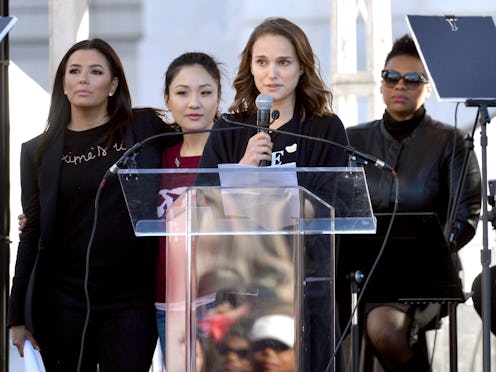Entertainment
Natalie Portman’s Experience With Sexism As A 13-Year-Old Actor Is Revolting

It's been a year since the inaugural Women's March, which took place on January 20, 2017. This year, women once again came out to protest in large numbers and many shared their stories at the event. In her Women's March speech, Natalie Portman shared how her experience in Hollywood as a young girl limited her career and self-expression.
The actor took the stage at the Los Angeles march alongside other actors and activists, including Eva Longoria and Constance Wu. Portman spoke to the tens of thousands in the crowd, sharing a story about her early career in Hollywood. After appearing in Léon: The Professional at just 12 years old, she was bombarded by inappropriate and sexualizing behavior from journalists, radio stations, and the general public. The reception made her feel incredibly unsafe, and led her to limit her personal and professional choices.
"I turned 12 on the set of my first film, Léon: The Professional, in which I played a young girl who befriends a hit man and hopes to avenge the murder of her family," Portman said. "The character is simultaneously discovering and developing her womanhood, her voice, and her desire. At that moment in my life, I, too, was discovering my own womanhood, my own desire, and my own voice. I was so excited at 13, when the film was released, and my work and my art would have a human response. I excitedly opened my first fan mail to read a rape fantasy that a man had written me."
Portman went on to tell of a variety of harrowing experiences that plagued her as a child star, and how these behaviors impacted her professional and personal life from that young age.
"A countdown was started on my local radio show to my 18th birthday, euphemistically the date that I would be legal to sleep with. Movie reviewers talked about my budding breasts in reviews," she said. "I understood very quickly, even as a 13-year-old, that if I were to express myself sexually, I would feel unsafe. And that men would feel entitled to discuss and objectify my body to my great discomfort. So I quickly adjusted my behavior."
In response to this alarming behavior, Portman was forced to seek out more conservative roles and cultivate a "conservative" and "serious" persona. She even dressed deliberately, purposefully choosing clothes that would be received as "elegant." If she hadn't, she knew her privacy would continue to be violated and her ideas would not be taken seriously. "I built a reputation for basically being prudish, conservative, nerdy, serious, in an attempt to feel that my body was safe and that my voice would be listened to," she said.
From a young age, it was clear that every decision, from the way she dressed to the roles that she took, would have to cater to a society that polices women's bodies and their behavior. Portman even described taking the culture and response into consideration before choosing roles, and she noted that for a long time she wouldn't audition for roles that had as much as a kissing scene. "I rejected any role that even had a kissing scene, and talked about that choice deliberately in interviews. I emphasized about how bookish I was, and how serious I was," she said.
A major point of Portman's speech was to draw attention to men who complain that the #MeToo movement will inspire a wave of conservatism or Victorian-era prudishness. Her story shows how this movement will encourage the opposite, and how the current oppressive climate pushed her toward conservative choices. She points out that true liberation is creating a culture where everyone can feel safe to express themselves in their creative and personal lives.
This speech isn't the only recent time where Portman has spoken up for women. She's been a major advocate of the #TimesUp movement, and helped establish the organization's legal defense and advocacy fund along with over 300 women in Hollywood. The organization debuted at the Golden Globes, where Portman made headlines for calling out the gender inequity in the director category by introducing the "all-male nominees."
At the Women's March, Portman noted the progress women have already made. "One year ago on this stage, I was very pregnant and we talked about the beginning of a revolution. Today, my new daughter is walking and because of you the revolution is rolling" she said. "You told the world that time's up on violence, you told the world that time's up on silence, you told the world that it's time for a new day, it's time for a new locker-room culture, it's time to think about every person's desires, needs, wants, and pleasure."
This year, several actors and artists gave powerful and moving speeches at the Women's March. Viola Davis spoke on behalf of the women who have not been able to share their stories, Halsey read a poem about sexual assault, and Scarlet Johansson called out hypocrisy in the entertainment industry. Portman's own story added to their voices and many more, and pointed out how damaging and limiting the current culture can be for women. "A world in which I could wear whatever I want, say whatever I want, and express my desire however I want without fearing for my physical safety or reputation," she said. "That would be the world in which female desire and sexuality could have its greatest expression and fulfillment."
If you or someone you know has been sexually assaulted, call the National Sexual Assault Telephone Hotline at 800-656-HOPE (4673) or visit online.rainn.org.